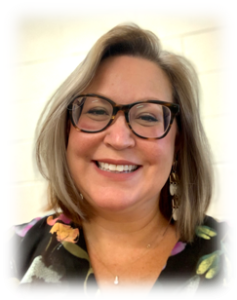Growing up, I yearned for freedom. Freedom to make my own decisions. Freedom from my parents. Freedom to be myself in a world that didn’t really like headstrong girls or women.
When I questioned Sunday School teachers or offered a different viewpoint in my church or school, I often felt I was the sole person probing the world and the people in it for answers. I think it generally made others uncomfortable. Unfortunately, I still find that discomfort to be the norm.

Julia Goldie Day
Now a mother of three in my early forties, I’m still searching. I’m still exploring who I am and how I live in the world as a woman with an unrelenting sense of curiosity and a desire for freedom driving me.
After recently finishing a Doctor of Ministry degree in leadership, I have continued studying the gospel of Luke that began with my thesis research. I studied and tested how to create a sexually healthy ethic in churches. Mary, the mother of Jesus, was my guide in Luke 1:26-38, 46-55. She influenced how I thought about an ethic of wholeness and freedom for all people, including women and people who experience less freedom and more abuse.
I concluded people are capable of making decisions out of a sexually healthy ethic developed from a foundation of faith and understanding of Scripture. We all have the ability to be leaders of our own bodies. This increases healthy choices and boundaries and decreases the risk of shame, suicide, sexual abuse and assault. In this framework, we embrace and encourage freedom. Individuals experience support as they seek to make good decisions and live life in abundance.
During the implementation stage of my D.Min. project, I shared with parents how their teenagers might develop different values and ethics from their own. That’s OK. We don’t want to create perfect carbon copies of ourselves, but we do want to have great influence with our children as they develop and grow their own sense of identity. As they do the hard work of becoming themselves, we should trust them with that process and hope to work alongside them.
Freedom can be scary. If we raise our teenagers with freedom to create their own art of living their faith, what will they do or be or believe that makes us uncomfortable? If our churches call women as pastors and accept LGBTQ people as Sunday school teachers, deacons or even pastors, what will happen once we open those doors? This necessary leap of faith requires trust in a God who gives us the gift of freedom and ultimately joy.
People who routinely step through the doors of their local Baptist churches lack this understanding of following Jesus.
It is important to understand the process of living in freedom will not be without learning and change. When we make a mistake or cause harm, we must change to make things right. We can say we are sorry for the harm we have caused, and we make repairs to do better in the future. Sometimes the harm we cause isn’t a mistake because our intent was harmful, and much more is required to reconcile the wrong. We must face consequences for the harm we cause. That is what life as Jesus followers must be like. Freedom to step forward knowing we are fallible yet responsible for our work of living in the world.
We learn, we change, we hope to become more like Jesus.
I have observed that people who routinely step through the doors of their local Baptist churches lack this understanding of following Jesus. Our very lives must echo the teachings of Jesus, who lived a life of radical love.
Living this way is not easy. It demands risks from us, and others may feel uncomfortable that we, like Jesus, upset the status quo.
On this journey of freely living in love, it’s not enough to know the Scriptures, it’s not enough to attend church and Sunday school, it’s not enough to vote a certain way or believe a certain tenet of faith or rely on easy moralism. Living our faith is what is required, and the result is growth — the good fruit produced in our lives.
Sadly, I was not surprised by the recent Guidepost Solutions report on the Southern Baptist Convention’s coverup of sexual abuse of children and women. Many leaders failed women and children and did not live their faith.
Why? Why did so many look the other way? Why did so many work to cover the patterns of abuse? Why did so many choose to abuse and greatly harm God’s creations?
The answer is about freedom, or the lack thereof. Many men in powerful positions want to hoard power for themselves. Many others just want to uphold the status quo — a system in which people are comfortable with an imbalance of power, where survivors are blamed and abusers excused.
This abuse of freedom isn’t a part of God’s plan.
Fortunately, God’s freedom cannot be contained or limited to a select few. When our lust for power removes God-given freedom from others, we have sinned. We have caused harm to our neighbor, and we are breaking God’s laws. We must accept the consequences.
The truth is we each have power within to make our own decisions, create our own boundaries and live our lives as we walk our own path of holiness. Many men in powerful positions in churches, faith organizations and denominations — even those outside of the SBC — would be happy if women and children and others our culture deems powerless didn’t know this truth. Complementarianism and purity culture in the SBC and elsewhere rely on this truth being obscured.
Abuse will continue as long as the church holds hostage the freedom and power that already is instilled in each of us. People will continue to abuse and be abused as long as freedom is repressed.
People will continue to abuse and be abused as long as freedom is repressed.
What does Mary in the Gospel of Luke have to teach us about freedom and the power of God?
Mary sings in her song, the Magnificat: “God knocked tyrants off their high horses, pulled victims out of the mud. The starving poor sat down to a banquet; the callous rich were left out in the cold” (Luke 1:52-53).
The God who Mary sings about is a God of freedom, a God who rejects an unjust allotment of power. When the powerful abuse the weak, God is not pleased. In fact, God holds them responsible, as should we.
Mary implores us to be on God’s side in these matters. She sees the future of God’s kin’dom. This kin’dom of God doesn’t flip the switch and give all the power to the powerless but brings us all to equality in power, which is true freedom. We desperately need this hope of freedom that Mary sings in her song.
Abuse will continue as long as the church holds hostage the freedom and power that already is instilled in each of us. Abuse will continue as long as the powerful believe God has made them and only them powerful. Abuse will continue as long as we continue to deny that the God we serve gives us freedom. Even women. Especially women, children, people of color and LGBTQ people.
Mary is a hero for all. She sings her victory song and takes her essential place in God’s story. Mary shows us that belief in this God who levels the playing field is just the beginning of how we all should respond to the gospel. This belief led Mary to action and should lead us to action in living our lives — claiming freedom for ourselves and for others, holding those who abuse freedom to account.
I’m getting more comfortable with being uncomfortable. More comfortable with others being uncomfortable with me and my power and freedom in this time where women — and many others — are often harmed and made powerless. I have been given a power that each of us possess if we are brave enough to embrace our freedom in Christ.
Let it be with us as it was with Mary.
Julia Goldie Day is ordained and affiliated with the Cooperative Baptist Fellowship and lives in Memphis, Tenn. She is a painter and proud mother to Jasper, Barak and Jillian. Her website is https://juliagoldie8.wixsite.com/website.
Related articles:
Women in ministry face daily slights that add up, BWIM leaders explain
Jesus calls women to ministry by name and asks them to rise up, Stewart says in fiery BWIM sermon


